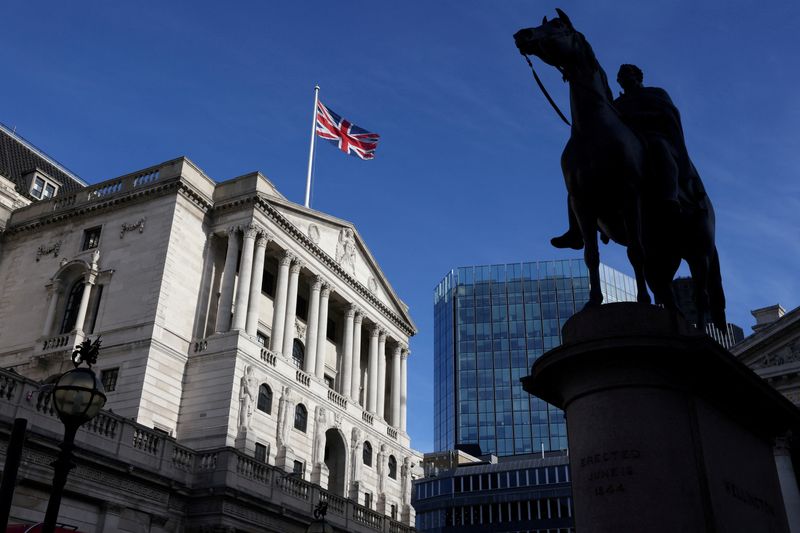BoE seeks to scrap interest rate check for mortgage borrowers
Reuters
Published Dec 13, 2021 12:30PM ET
Updated Dec 13, 2021 03:17PM ET

By David Milliken and Huw Jones
LONDON (Reuters) -The Bank of England wants to scrap a rule that mortgage borrowers must be able to afford an interest rate increase of 3 percentage points, it said on Monday, a move lenders said could help homebuyers.
The British central bank said its requirement for most mortgages to be no more than 4.5 times a borrower's income, plus separate affordability rules from the Financial Conduct Authority, were sufficient.
The BoE will consult in the first half of next year on the change, which it said did not represent a loosening of standards and would preserve financial stability "in a simpler, more predictable and more proportionate way".
The current rule came into force in 2014 during a shake-up of lending regulation after the global financial crisis.
Since then, interest rates have stayed close to record lows, and although financial markets expect the BoE to start raising rates soon, they do not see borrowing costs getting anywhere close to levels seen before the financial crisis.
The BoE said a lower long-term outlook for interest rates did not automatically mean smaller risks for borrowers, as it partly reflected weaker prospects for incomes and meant there was less scope for borrowing costs to fall in a downturn.
But it said its loan-to-income rule was in practice more stringent than the interest rate rise affordability check.
Paul Broadhead, head of mortgage and housing policy at the Building Societies Association, said the change would help some first-time buyers and those in pricy parts of southeast England.
"(They) can clearly afford a mortgage but are hindered by the requirement to test that they could still pay their mortgage if rates were in the region of 6% plus," he said.
BIGGER RISK BUFFERS
The BoE also said it would increase the counter-cyclical capital buffer (CCyB) that banks must hold to smooth lending over the course of the economic cycle, to 1% of risk-weighted assets from zero currently, effective from the end of next year.
If the economy grows as the BoE expects, then in the second quarter of 2022 it expects to raise the CCyB to 2%, effective from Q2 2023. The BoE cut the CCyB to zero at the start of the COVID-19 pandemic to boost lending.
The increase to 1% implies British banks must hold an extra 11 billion pounds ($14.6 billion) of capital. Lenders already hold more capital than the regulatory minimum, however, so will not need to raise more, even if the CCyB rises to 2%.
Britain's top eight banks, including HSBC, Barclays (LON:BARC), Lloyds (LON:LLOY) and NatWest - with Virgin Money (LON:VM) included for the first time - all passed the BoE's stress test.
BoE Deputy Governor Sam Woods said it was "business as usual" for bank dividends, meaning no return to last year's temporary suspension due to the pandemic.
The central bank acknowledged risks to the British economy's recovery posed by the Omicron variant of the coronavirus.
"There are near-term pressures on supply and inflation, and there could be a greater impact from COVID on activity, especially given uncertainties about whether new variants of the virus reduce vaccine efficacy," the BoE said.
But Governor Andrew Bailey told a news conference he did not think Omicron's emergence risked fresh market turmoil like that seen at the pandemic's start.
"I don't think that we are in a situation where there is ... stress around the corner in terms of markets," he said.

The BoE's separate Monetary Policy Committee is due to announce its latest interest rate decision on Thursday. Investors have rowed back bets on a rate hike this month because of the uncertainty posed by Omicron.
($1 = 0.7561 pounds)
Written By: Reuters
Trading in financial instruments and/or cryptocurrencies involves high risks including the risk of losing some, or all, of your investment amount, and may not be suitable for all investors. Prices of cryptocurrencies are extremely volatile and may be affected by external factors such as financial, regulatory or political events. Trading on margin increases the financial risks.
Before deciding to trade in financial instrument or cryptocurrencies you should be fully informed of the risks and costs associated with trading the financial markets, carefully consider your investment objectives, level of experience, and risk appetite, and seek professional advice where needed.
Fusion Media would like to remind you that the data contained in this website is not necessarily real-time nor accurate. The data and prices on the website are not necessarily provided by any market or exchange, but may be provided by market makers, and so prices may not be accurate and may differ from the actual price at any given market, meaning prices are indicative and not appropriate for trading purposes. Fusion Media and any provider of the data contained in this website will not accept liability for any loss or damage as a result of your trading, or your reliance on the information contained within this website.
It is prohibited to use, store, reproduce, display, modify, transmit or distribute the data contained in this website without the explicit prior written permission of Fusion Media and/or the data provider. All intellectual property rights are reserved by the providers and/or the exchange providing the data contained in this website.
Fusion Media may be compensated by the advertisers that appear on the website, based on your interaction with the advertisements or advertisers.